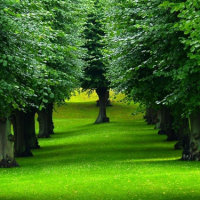Landscaping Tips: What Mulch to Use for Trees

One question that comes up this time of year a lot is what is the proper mulch to use for trees. It’s easy to grasp the basic premise of mulch, but when people go to their local nursery they see many different kinds. How do you know which one to use? The short answer: wood chips.
The very best mulch to use for trees is something that is going to decompose gradually. Mulch made from wood chips fits the bill perfectly, since it rots slowly, and as an added bonus, this mulch is quite low in nutrients so will not encourage weed growth. Composted wood chips are the preferred material; these can be used as durable, low-maintenance mulch, which weathers to a silver-gray color.
The bad news is that most wood chip mulch is sold as fresh material, not in a composted or aged state. These chips also decompose slowly, but as they do decompose, microorganisms develop in the mulch and use nutrients from the soil that might otherwise be available for plant growth.
Composted material will not support these microorganisms, which is why it is the preferred material. One solution to this dilemma is to buy un-composted wood chips ahead of time and compost them yourself. Put them in a backyard composter along with some leaves, twigs and bark. Make sure to keep it well aerated and turned to prevent bad smelling mulch.
Go Organic
Organic mulches are advantageous also for their soil-enhancing characteristics, as opposed to inorganic mulch materials like crushed rock, gravel, tarps, and landscape fabrics. As organic mulches decompose over time, they slowly discharge tiny quantities of nutrients and to the soil. Therefore your layer of mulch should be renewed as needed to maintain a 2- to 4-inch depth.
For individual trees, your mulched area should cover from 3 to 6 feet out from the tree’s base. It is best to clear the mulch away 1 to 2 inches from the base of plants to help prevent damage to the tree trunk from insects, excess moisture, and diseases. In fact, this is the classic mistake that many people make with mulching trees.
You shouldn’t have a pile of wood chips around your tree that resembles the thing Richard Dreyfuss made in his kitchen in Close Encounters of the Third Kind. Rather, it should look more like a flattened donut. This also holds true for mulching shrubs, by the way.
Follow these simple tips and your tree should do well and require less watering and fertilizer than an unmulched tree.




